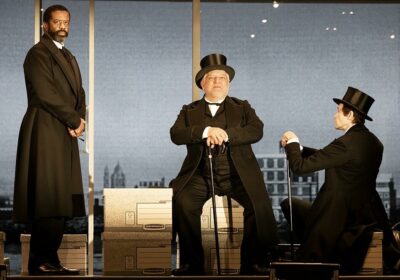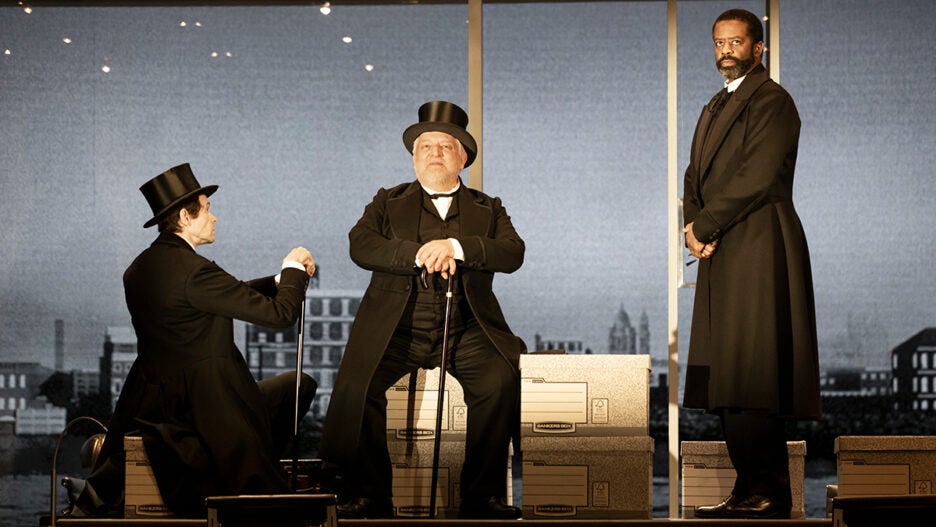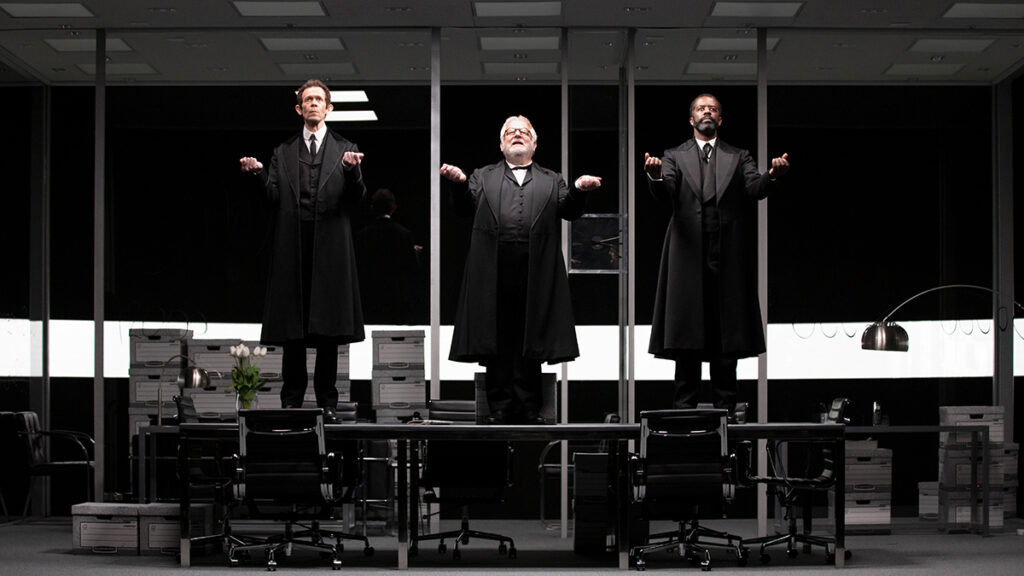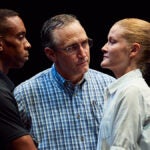The Lehman Trilogy Broadway Review: Sam Mendes Directs a Family's Undoing

Stefano Massini’s saga of an American empire gone belly up returns to New York City
Photo: Juliana Cervantes
When a play holds your attention for more than three hours, the writer, with help from a gifted director, must be doing something right. While much of the theatergoing public thinks it’s a plus to escape a play in fewer than 90 minutes, a growing number of writers still take the time to let their stories unfold, their characters develop. It was almost a trend among new plays on the boards in New York City before the pandemic closed theaters. In addition to the long-running “Harry Potter and the Cursed Child” on Broadway, there was Suzan-Lori Parks’s “White Noise” at the Public Theater, Jeremy O. Harris’s “Daddy” at the Pershing Square, and Jez Butterworth’s “The Ferryman” on Broadway. Now, to remind us that plays can still handle a full three acts, there’s Stefano Massini’s “The Lehman Trilogy,” which opened Wednesday at Broadway’s Nederlander Theatre.
“Trilogy” clocks in at three hours and 20 minutes, and now stands alone among those aforementioned legit behemoths, that is, until “Harry Potter” reopens on November 12. The play was originally conceived as a radio drama that lasted five hours on Italy’s Rai Radio 3. It first aired in 2012, but soon took form as a play (and a novel) that traveled throughout Europe before it landed at London’s National Theatre, where Sam Mendes directed the English translation by Ben Power. It’s that production that played the Park Avenue Armory in New York City in 2019, and now makes its Broadway debut.
“The Lehman Trilogy” remains very much a radio play, albeit a shorter one than the original. It’s an American saga about three real-life Jewish immigrants from Bavaria who, pre-Civil War, arrive in Alabama to open a little shop that grows to become the fourth largest investment bank in the United States before going spectacularly bankrupt in 2008.
The audacity of “The Lehman Trilogy” is that Mendes’ direction keeps it radio-play simple. The three Lehman brothers are played by Simon Russell Beale (Henry), Adam Godley (Mayer) and Adrian Lester (Emanuel) — who also play the brothers’ wives, children and a few dozen other characters who all wear the same black long coats (the serviceable costumes are by Katrina Lindsay) that the men wore upon first stepping foot in America.
The three actors don’t so much perform the story as they tell it to us, complete with “he said” and “she said.” (Those who sat through “Gatz,” the Public Theater’s eight-hour reading of “The Great Gatsby,” will recognize the experience.) But it’s best not to close your eyes simply to listen. The curtain at the Nederlander Theatre rises to reveal Es Devlin’s revolving transparent glass box set. It features one large modern board room, an office lounge and another smaller room filled with packing boxes that often make their way to the other two rooms to function as chairs, stairs, counter tops, a tower and a kind of crypt (the brothers have nightmares).
As the glass box turns, this way and then that way, the three actors walk from room to room. Occasionally the box stops, and that’s generally when a full scene is either enacted or told to us, but not always. The stock market crash of 1929 sees Robert Lehman (Godley), the son of Philip Lehman (Beale), as he attempts to keep the company afloat despite nagging from his wife (also played by Beale) and Philip, while a dozen or so stockbrokers (played by Lester) commit suicide.
I grew up thinking that most of these financial types jumped out the office window, but “The Lehman Trilogy” tells us that many preferred blowing their heads off with a pistol.
It’s a tour de force of direction and writing and Devlin’s set rarely rests under Jon Clark’s always dramatic lighting. Better yet, the designer’s big glass box is framed by a Imax-like cyclorama that keeps updating us on the physical rise of Manhattan’s ever-changing skyline — until we’re literally swamped in nothing but office buildings (stunning videos by Luke Halls). Also thrilling is the depiction of a plantation fire, much earlier in the story, that the first Lehman brothers exploit to grow their store from a pop-and-pop operation to a major force in the cotton business.
We learn a lot about cotton in “The Lehman Trilogy.” We learn almost nothing about the coffee business, even though it made the boys far more money — or so we are told. Massini performs that kind of sleight-of-hand throughout the evening. For instance, while we’re being dazzled by Mendes’ direction of the 1929 stock market crash, we never learn how Robert Lehman actually saved the company — except that he worked hard.
Also, sometime right before that 20th-century financial meltdown, much character development goes on during the play’s second intermission. Philip Lehman morphs into a doddering old dad after being the resident genius, while Robert Lehman switches from artsy dilettante son to the new resident genius.
From watching “The Lehman Trilogy,” one might get the idea that these three brothers and their offspring were intimately involved with the popularization of cigarette smoking or the creation of the atomic bomb or the making of the movie “King Kong.” These cultural signposts sparkle, catch our attention and then are dropped. That’s the thing about investment. Or as Massini repeatedly tells us: When money is only words it doesn’t really exist. And neither is it very dramatic. Perhaps that’s why “The Lehman Trilogy” spends so much time on the courtships of the Lehman men to such unremarkable women.
Since Act 3 begins with the stock market crash and takes up about half an hour, I began to wonder how Massini was going to explain the 2008 bankruptcy of the Lehman Bros. It’s why I wanted to see “The Lehman Trilogy” when it played the Armory.
He doesn’t explain it.
Robert Lehman was the last of the clan involved with the company, and before dying in 1969, he added a trading division run by an evil Hungarian named Lew Glucksman (Lester), who made the company more money than any of the Lehmans ever thought possible. Glucksman eventually bought out an evil Greek named Pete Peterson (Beale), who had been president, and faster than anyone can say “We’re a car with no brakes!” the show is over.
Almost a decade ago, a play from London titled “Enron” opened and quickly closed on Broadway. It bored me, but I learned everything I wanted to know about the Enron disaster. I learned next to nothing from “The Lehman Trilogy” about why Lehman Bros. went belly up. But I wasn’t bored.
What “The Lehman Trilogy” lacks in depth, it makes up for in sweep and scope.
Among all the whirling stories and glass walls on stage, your mind may wander to wonder how three immigrant Jews could encounter so little discrimination in Montgomery, Alabama, in the middle of the 19th century. Or why their wives were so tedious and why Massini gave them so much stage time. In addition to the wives and kids being ciphers, the three actors under Mendes’s blunt direction turn them into comic relief: Lester sucks his thumb, Beale resorts to falsetto. These actors should buy tickets to “Lackawanna Blues” to see how Ruben Santiago-Hudson portrays characters of both sexes and all ages without stooping to cheap effects.
Playing a 140-year-old Lehman, Godley does convince us that dancing with capitalism, when it’s reduced to nothing but trading, can kill a person.
Source: Read Full Article




